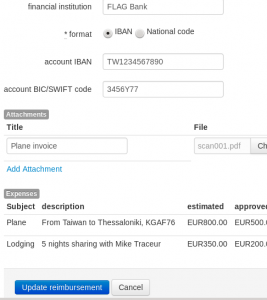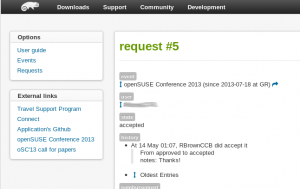
Today, Ancor Gonzalez Sosa writes about the Travel Support Program Application he developed with the openSUSE Team.
Traveling to an event to represent your project, sharing experiences with other people with common interests and showing them what you are passionate about is absolutely awesome – but it can get expensive. This is why openSUSE introduced a Travel Support Program last year.
The openSUSE Travel Support Program
The goal of the Travel Support Program is to support contributors representing openSUSE at events by reimbursing up to 80% of the travel and/or hotel costs. In turn the contributors make a worthy contribution at the event and report back to the openSUSE community about what they did.
We’re not alone in doing this, having drawn inspiration from GNOME’s Conference Travel Subsidy Program, the KDE e.V. Travel Cost Reimbursement initiative and the Travel Policy from The Document Foundation.
The program is sponsored by SUSE, but the Travel Committee independently manages the money and decides who is supported and how. This is a lot of work: decisions involve the event itself, the contributor asking for support, other Geekos in the area, the costs and of course the entire budget. The team also has to plan the priority of events with the marketing team and communicate about the status of the requests and reimbursement.
And the Free Software world was lacking a proper tool to manage all this… until now!
The brand new TSP application
We developed a new web tool to make the life of the TSP team and the community easier and do this in an open and generic way so other projects could benefit as well. We’ve started using it already for the upcoming openSUSE Conference 2013 and you can see it in action here. It even offers a pretty diagram explaining the TSP process! Of course, the complete source code of the project can be found on Github.
Development
For a more detailed explanation of the goals of the project you can refer to the ‘about the TSP application‘ page in our projects management tool. In that page you will find ‘the 6 Ws’ of the new application: who, what, when, where, why and how (yes, we know that ‘how’ does not start with ‘W’, but we didn’t invented the 6Ws term).
During development we honored the motto “release early, release often” and worked following agile development principles. We begun by collecting ideas and requirements of the TSP team and the people handling the payments on the SUSE side. After developing a first prototype, it was presented in a video conference. You can find the minutes of this meeting in the project’s wiki.
Once the feedback was in and new goals were set, the prototype was deployed on a provisional server in order for the Travel Committee to test it. Using this test-drive installation, the application was improved in an interactive way. Every two weeks (sometimes a bit longer), a new version was installed. Izabel tested the new version providing very useful feedback used to plan the new milestone in our projects management tool and so on. This cycle is still in motion: new version, feedback, planning, new version…
Awesome Rails goodies
While working on the TSP application we have developed some features that can be interesting for other Ruby on Rails programmers working within the openSUSE infrastructure, like the team behind OSEM. The TSP application includes a Devise backend for the openSUSE authentication infrastructure, a Bento theme for Bootstrap (written in pure Less) and integration with openSUSE Connect through its REST API. We plan to release all these features as individual components to allow reuse in other openSUSE developments.
Present and future, sharing with others
We plan on continuing maintenance of the application and as with most free software projects, it’s hard to predict in which direction the tool is going to evolve. Conference volunteers in charge of the visa invitation letters and the team in charge of merchandising shipping already made some interesting suggestions so it will not be a surprise if we end up developing a full event management tool. Not for registration and scheduling individual conferences -the oSC’13 guys are already doing a great job developing OSEM– but for the administrative tasks and planning behind the attending various events that communities like openSUSE do.
Concluding
So, if you are an openSUSE contributor and you might need sponsorship for traveling in the future, bookmark the TSP page! If you are a Ruby on Rails developer, just Fork it on Github™ and meet us at oSC’13 to talk about future collaboration. And if you are in charge of a travel support program for another open source project or are thinking about the possibility of starting one, you can run it yourself and we’d be happy to help you in case of trouble. You can find me (Ancor Gonzalez Sosa) as ancorgs in the openSUSE-Project channel on Freenode.
And always remember: have a lot of fun!

